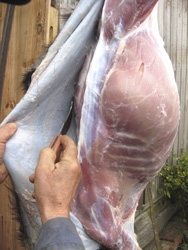Turning animal by-products into soil treatment
After the bovine spongiform encephalopathy (BSE) epidemic of the 1990s, the use of animal by-products for animal feed was halted. Since then, the resultant waste stream has cost the EU millions of euros in disposal measures. APTAR was an EU-funded project initiated to investigate the use of these by-products as plant food or biopesticides in commercial agriculture. It was a consortium of meat and agriculture sector small and medium-sized enterprises (SMEs) as well as research institutions. Project researchers started by characterising various by-products and determining an optimum pre-treatment strategy. They then developed a process that employs enzymes and microorganisms to digest the by-products for future use. A 1 600-litre mobile bioreactor was built and tested successfully. Animal by-products processed in this bioreactor were tested as biostimulants and biopesticides. Researchers found that nutrient value and pest control was enhanced in field tests. APTAR thus successfully produced an organic fertiliser or soil treatment, and the process is economically feasible. The project's low-cost alternative process could add value to what would otherwise be a waste stream.







